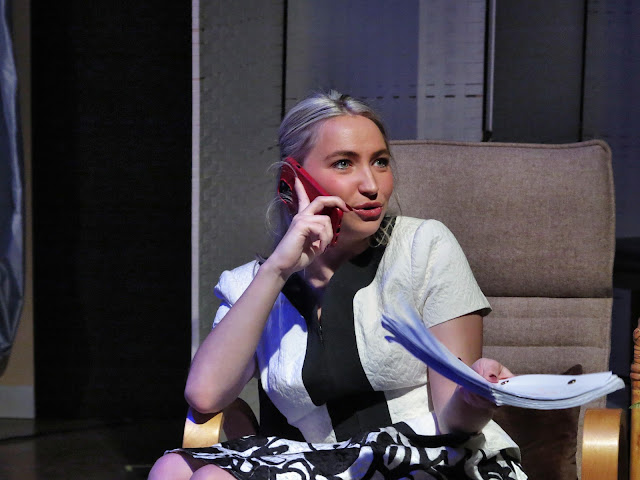Review: "The Script in the Closet" Opens Some Locked Doors
The Script in the Closet
Written and directed by Joyce Griffen
Presented by La MaMa Experimental Theatre Club at The Downstairs
66 E 4th St., Manhattan, NYC
March 1-17, 2024
 |
| FRONT L-R: Kristin Johansen as Valerie, Ruth Kavanagh as jealous wife Lynn. BEHIND: Tom Staggs as Noah. Photo by Jonathan Slaff. |
The play opens with actors Micha (Tina Harper) and Robert (Patrick Huang) preparing to perform at the birthday of a child of a wealthy Upper East Side family. Their performance provides both the very funny sight of Robert rehearsing for a dramatic film audition while costumed as a children's cartoon character and, when circumstances conspire to cause Robert to leave his copy of the screenplay behind in the family's linen closet, the inciting incident for the comic misapprehensions to follow. The apartment that Micha and Robert leave so hastily belongs to Lynn (an entertaining Ruth Kavanagh) and Lionel (Mark De Rocco), partners in fiction writing as well as in marriage. The Pulitzer-winning couple employ a domestic laborer, Doris (Carrie Wilder), as well as a live-in childcare worker, Zoey (Charlotte Jones), who cares for their younger son, Jonathan. Zoey, a young woman with her own aspirations to a writing career, finds Robert's incomplete copy of the film script and, believing it to be the work of her employers, decides to try her hand at writing some further pages–using the computer that Lynn and Lionel share. When Lynn finds this work, she mistakenly assumes that her husband, who has always taken against screenwriting, must be cheating on her, in both possible senses, with another writing partner. Increasing the confusion, Lionel does later add to this piece of writing, and he won't be the only one. At times, we hear portions of this evolving script in voiceover, a clever choice for the actors to play off of. Assumptions beget further assumptions, and plots and counterplots for getting even lead everywhere from accessory-based attempts to reignite bedroom sparks to clandestine assignations.
 |
Charlotte Jones. Photo by Jonathan Slaff. |
 |
Isaiah Stannard as son, Carlton, and Ruth Kavanagh as jealous wife Lynn. Photo by Jonathan Slaff. |
The play incorporates some satire of the wealthy, including the surveillance of domestic labor in the form of an oft-defeated nanny cam, though it is of a rather forgiving variety. The show's primary concern is with jealousy and possessiveness; from Doris's daughter to the central family and friends to even Robert and Micha, jealousy has affected or continues to affect their romantic relationships, a possessiveness to which the collaborative writing that takes place could be seen as antithetical (theater, too, favors collaboration in this way). The overwhelmingly grounded performances help to underscore the serious aspects of such possessiveness, though, at the same time, the production could perhaps lean more heavily into its heightened elements. Whether creativity on the page or in the bedroom, The Script in the Closet proposes that openness and trust will pay the best dividends.
-John R. Ziegler and Leah Richards



Comments
Post a Comment